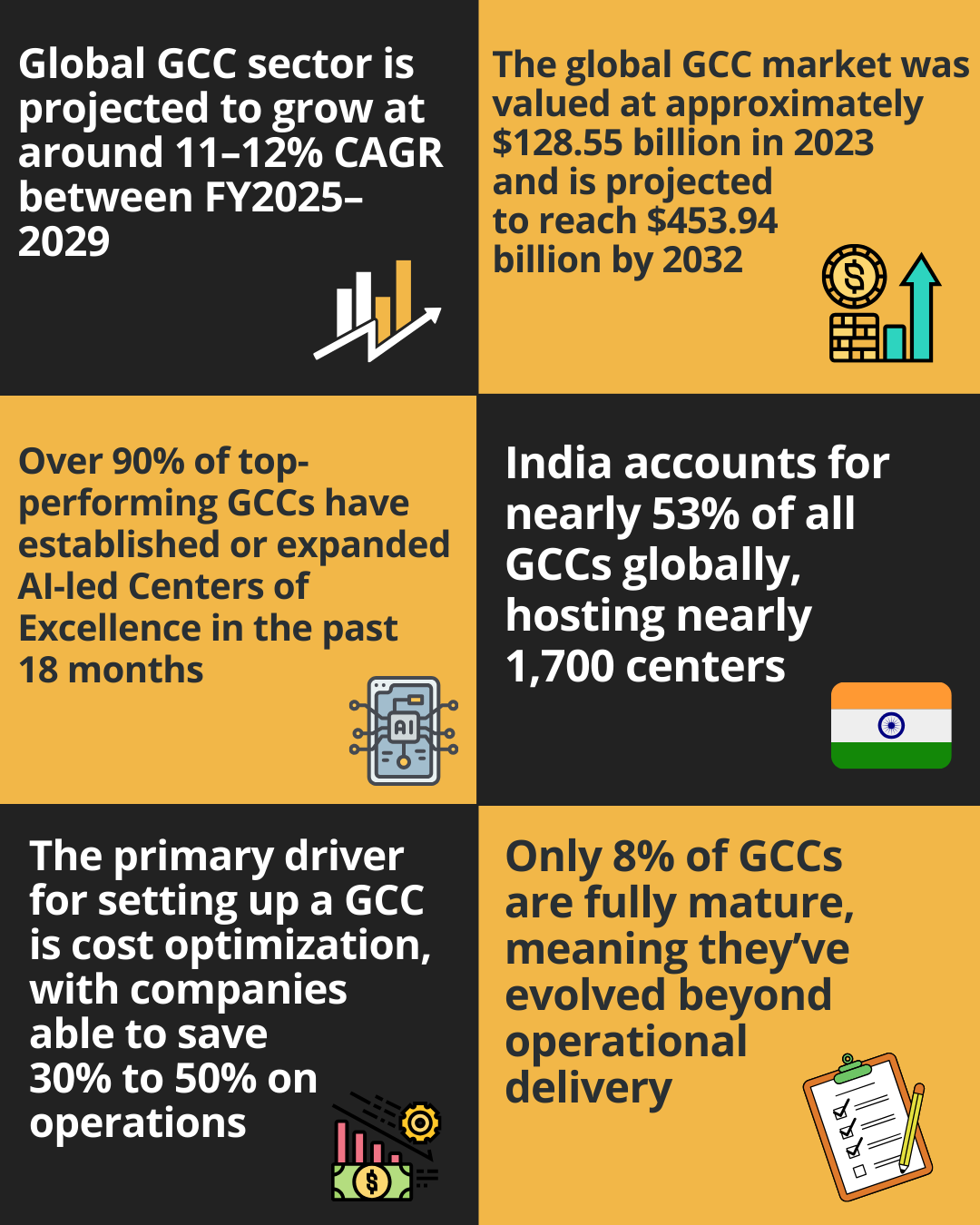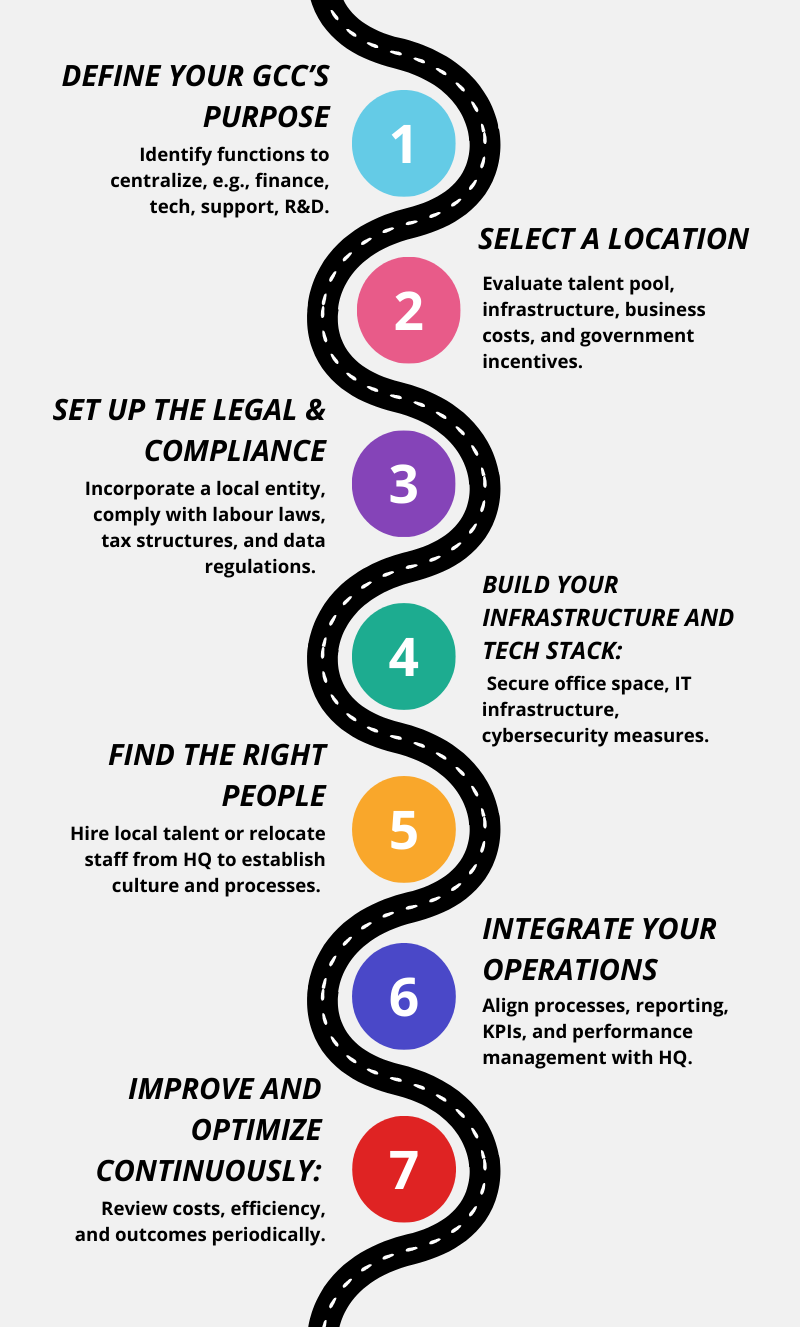If you’ve been hearing more about Global Capability Centres (GCCs) and wondering, “Should I set up a GCC for my business?”. This guide will walk you through everything you need to know.
We’ll cover what a GCC is, the problems they solve, how they differ from other offshore models, and the step-by-step process to establish one.
Key Takeaways
- A Global Capability Centre (GCC) is an offshore unit that is fully owned and run by a parent company to handle specific business functions.
- GCCs can solve business problems like struggling to hire enough people, high costs, market delays, and inconsistent operations across locations.
- Unlike outsourcing, a GCC is an extension of your company, giving you full control over your processes and quality.
- India is a leading destination for GCCs, hosting nearly 53% of all centres globally due to its talent pool, cost advantages, and a mature ecosystem.
- To ensure a successful GCC, it’s important to focus on leadership presence, clear KPIs, integration with the main headquarters, and innovation.
What is a Global Capability Centre (GCC)?
A Global Capability Centre (GCC) is an offshore unit fully owned and operated by a parent company to carry out specific business functions, from finance and accounting to R&D, IT, HR, or analytics. Unlike outsourcing, where you rely on a third-party vendor, a GCC is an extension of your organization, operating with your processes, culture, and quality control.
In recent years, GCCs have moved beyond cost arbitrage to becoming hubs of innovation and strategic growth for global companies. In fact, the Global GCC sector is projected to grow at around 11–12% CAGR between FY2025–2029 [1].
So, what does a GCC actually do? The answer is: almost anything your headquarters does. A GCC can manage finance and accounting, IT services, human resources, analytics, legal, R&D, procurement, or even customer support. Many companies also use GCCs to centralize knowledge-intensive work such as product development and innovation programmes.
The model is flexible: you decide what work gets centralized into the centre.
Companies often start a GCC for cost efficiency, but the role of GCCs has expanded. Today, GCCs act as innovation hubs, centres of excellence, and strategic enablers of growth. For many organisations, they are not just about reducing costs but about gaining access to global talent, driving 24/7 operations, and building resilience into their business model.
Now, if you’re asking yourself, “Should I set up a GCC?” or “Is a GCC right for my business?”, the key point to understand is this: a GCC is no longer just about cost-saving. It is about building a scalable, future-ready business model that gives you global reach and strategic depth.

Why Might You Need a GCC?
Companies today are under pressure to scale faster, manage costs, and access skilled talent and many find that local markets can’t keep up. This is where a Global Capability Centre (GCC) becomes a powerful solution.
Here’s how a GCC addresses some of the most common challenges businesses face:
I Struggle to Hire Enough People to Grow My Business
Recruiting at home is increasingly expensive and competitive. Skilled professionals in finance, IT, analytics, or digital roles are often in short supply, forcing companies into bidding wars for talent. A GCC gives you direct access to large offshore talent pools at scale, letting you build specialist teams quickly and cost-effectively, without being limited by local shortages.
I Want to Cut Costs but Don’t Want to Lose Control
Outsourcing may appear cheaper, but it often means compromising on quality, visibility, and alignment with your company’s culture. With a GCC, your offshore unit is fully owned and run by you. That means you can still achieve significant cost savings while keeping complete control over processes, performance, and compliance.
I Can’t Afford Delays in Going to Market
Speed is everything in today’s business landscape. Whether it’s launching a new product, rolling out new services, or scaling operations, delays can cost market share. A GCC allows you to build round-the-clock teams and accelerate delivery, ensuring your business remains agile and competitive.
I Struggle to Keep Operations Consistent Across Locations
Fragmented operations across vendors and regions often lead to inefficiencies, duplication of effort, and inconsistent results. A GCC provides a single, centralized hub where you can standardize processes, align performance metrics, and ensure global compliance, bringing stability to fast-growing businesses.
I Need My Business to Run Around the Clock
For companies serving global clients, a 9-to-5 operating model doesn’t cut it. A GCC located in a different time zone ensures 24/7 operations, enabling faster response times, continuous service, and higher client satisfaction.
In short, if you’re facing challenges with talent shortages, high local costs, scalability issues, or fragmented global operations, building a GCC can provide both stability and strategic advantage.
GCC vs BOT vs Outsourcing vs Offshoring
Only 8% of GCCs are fully mature [2], meaning they’ve evolved beyond operational delivery to drive innovation, competitive advantage, and strategic efficiency.
This raises an important question: is a GCC the right model for your business, or would outsourcing, offshoring, or a Build–Operate–Transfer (BOT) model be more suitable?
Before we dive into how these business models differ from each other, here’s a quick sneak into what each of these are all about:
Now, if you’re asking yourself, “Should I offshore, outsource, or set up a GCC?”, here’s how they differ:
- GCC (Global Capability Centre): Your own offshore operation, fully owned and controlled. Works best if you want scale, quality, and long-term capability without relying on third parties.
- BOT (Build–Operate–Transfer): A partner sets up and runs your offshore unit until it’s stable, then hands it over. Useful if you want a GCC but lack time or expertise to build from scratch.
- Outsourcing: Hiring a third party to handle non-core or transactional work. Comes with cheapest upfront, but lowest control and integration.
- Offshoring: Involves moving functions to a lower-cost country, either through your own entity or vendors focused mainly on savings, not necessarily long-term capability building.
GCCs and the Alternatives: A comparison
| Model | Legal ownership | Control | Contractual nature | Regulatory compliance | Liability | IP Ownership |
| GCC (Global Capability Centre) | Fully owned subsidiary of the parent company | Full control with parent company | Not vendor-based; part of the same legal entity group | Must comply with local laws as a registered legal entity (e.g., India’s Companies Act) | Full liability remains with parent company | Owned by parent company |
| BOT (Built-Operate-Transfer) | Initially vendor-owned, then transferred to client | Control transitions from vendor to client | Governed by BOT agreement with clear transfer clauses | Vendor initially complies; post- transfer, client must comply | Shared initially, then client assumes liability | Transfers to client at end of term |
| Offshoring | Can be client-owned or vendor based | Depends on model chosen (captive vs third-party) | Service agreement or subsidiary-based | If captive: client complies, if vendor: vendor complies | Depends on structure | Usually client –owned if contractually defined |
| Outsourcing | Vendor owned and operated | Minimal control by client | Outsourcing agreement | Vendor complies, client should ensure regulatory protections | Vendor liable, but SLA/contract clauses matter | Must be protected contractually; risk of leakage if not airtight |
The key difference is that a GCC is your own operation, whereas outsourcing hands control to a third party.
How to Set Up a GCC
If you’re wondering, “How do I set up a GCC in India or elsewhere?”, the process involves:

- Define Your GCC’s Purpose: Identify functions to centralize, e.g., finance, tech, support, R&D.
- Select a Location: Evaluate talent pool, infrastructure, business costs, and government incentives.
- Set up the Legal & Compliance: Incorporate a local entity, comply with labour laws, tax structures, and data regulations.
- Build Your Infrastructure and Tech Stack: Secure office space, IT infrastructure, cybersecurity measures.
- Find the Right People: Hire local talent or relocate staff from HQ to establish culture and processes.
- Integrate Your Operations: Align processes, reporting, KPIs, and performance management with HQ.
- Improve and Optimize Continuously: Review costs, efficiency, and outcomes periodically.
Why India is a Preferred GCC Destination
India has cemented itself as a global leader in hosting GCCs, particularly for accountancy firms. India accounts for nearly 53% of all GCCs globally, hosting nearly 1,700 centres across Tier-1 and Tier-2 cities [3].
Here are 5 indicators pointing why India is fast becoming the go-to destination for setting up GCCs:
Talent Pool Depth:
India produces thousands of finance and accounting graduates every year, many of whom are well-versed in global standards. This abundant talent pool ensures firms have access to skilled professionals for everything from basic bookkeeping to complex tax planning.
Cost Advantage with Quality:
While cost savings are significant, India’s value proposition extends beyond affordability. The country’s professionals are known for delivering high-quality outputs, making it a reliable destination for accountancy GCCs.
Mature Outsourcing Ecosystem:
India has been a hub for outsourcing for decades. This means firms can benefit from established infrastructure, streamlined processes, and tried-and-tested frameworks, reducing the learning curve for new GCC setups.
Technological Expertise:
Indian GCCs are at the forefront of adopting automation, AI, and cloud technologies in accounting processes. Over 90% of top-performing GCCs have established or expanded AI-led Centres of Excellence (COEs) in the past 18 months [4]. This tech-savviness ensures firms can offer cutting-edge solutions to their clients.
Cultural and Linguistic Compatibility:
English proficiency and a strong understanding of Western business practices make Indian teams easy to work with. This compatibility ensures that communication flows smoothly, a critical factor for maintaining service quality.
How to Make Sure Your GCC is Successful
If you’re wondering, “How do I ensure my GCC delivers real value?”, focus on:
- Leadership Presence: Deploy leaders from HQ in the early stages to embed culture.
- Clear KPIs: Measure productivity, quality, and business impact, not just cost savings.
- Integration With HQ: Avoid creating a silo, keep workflows and communication unified.
- Talent Retention: Offer career progression, training, and local market-competitive pay.
- Innovation Focus: Encourage the GCC to be more than a cost centre, use it to develop new capabilities.
How We Did it: Samera’s GCC Case Study
At Samera Global, we don’t just advise businesses on GCCs, we run one ourselves.
In 2023, we launched our first Global Capability Centre (GCC) in Delhi, a dedicated offshore hub supporting UK clients with accounting, compliance, and back-office operations. This was our first step toward utilizing India position as a strategic driver for global business.
By 2024, we had expanded our capabilities across finance, analytics, and client services, embedding automation and AI tools. What began as a delivery centre quickly evolved into a hub where innovation, technology, and strategic thinking shaped outcomes for clients in the UK and US.
In July 2025, we opened our AI Innovation Centre in Coimbatore, marking a shift from service delivery to creating AI-powered tools for finance, healthcare, and professional services.
Conclusion
If you’ve been asking yourself, “Should I explore a GCC for my business?”, the answer depends on whether you want to scale with control, quality, and cost efficiency. GCCs are no longer just about low-cost execution, they are about building global capability, speed, and resilience.
If you’re ready to explore what a GCC could look like for your business, our team at Samera Global can guide you through every step.
Bibliography
- https://www.newindianexpress.com/business/2025/Jun/26/global-capability-centres-to-generate-value-at-11-12-cagr-between-fy25-29-report
- https://timesofindia.indiatimes.com/city/bengaluru/bcg-report-ai-accelerates-gcc-maturity-evolution/articleshow/121631011.cms
- https://economictimes.indiatimes.com/industry/services/property-/-cstruction/india-houses-more-than-half-of-the-worlds-gccs-report/articleshow/122813040.cms
- https://timesofindia.indiatimes.com/city/bengaluru/bcg-report-ai-accelerates-gcc-maturity-evolution/articleshow/121631011.cms


